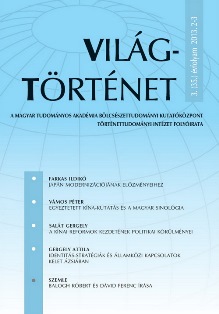Japán modernizációjának előzményeihez
The Antecedents of Japanese Modernization
Author(s): Ildikó FarkasSubject(s): History
Published by: Magyar Tudományos Akadémia Bölcsészettudományi Kutatóközpont Történettudományi Intézet
Summary/Abstract: Interpreting the process of Japanese modernization in the 19–20th centuries is still a challenge for social sciences and humanities; this process has been researched, interpreted and analyzed by several different “schools” and ideologies, with different approaches and explanations. According to the secondary literature of the past decades, many features of Meiji Japan (1868–1912) that were regarded “traditionally Japanese” have been proven to be “invented traditions” of an era of building a modern nation and national consciousness (e.g. state Shinto, or the emperor cult). It is true that creating a nation state with strong nationalism followed the European developmental pattern, but the material used for this was definitely of Japanese tradition. In the Edo period (1600–1868), in a still closed country, a cultural movement called kokugaku started in the 18th century which focused on Japanese classics, on exploring, studying and reviving (or even inventing) ancient Japanese language, literature, myths, history and also political ideology. “Japanese culture” as such was distinguished from Chinese (and all other) cultures, “Japanese nation” was thus defined. This process of “imagining community” took place before modernization, and not after, as a consequence of, modernizing Japan. The Japanese as an ethnic group or community (“ethnie”) started to evolve their own identity with cultural movements focusing on their “ancient” culture revealed by kokugaku, thus creating a new sense of community, the nation. “Japan” as social and cultural identity began to be imagined before modernity, and this significantly helped to carry on modernization successfully.
Journal: Világtörténet
- Issue Year: 2013
- Issue No: 2-3
- Page Range: 165-193
- Page Count: 29
- Language: Hungarian

